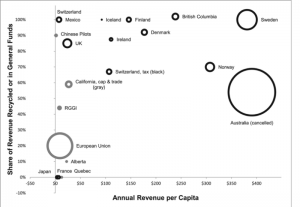by Meredith Fowlie, via Energy Post

The issue of carbon taxes is under debate in the U.S. Congress. The fear is a new tax will destroy jobs and hinder growth. Will it? Meredith Fowlie at the Energy Institute at Haas says the U.S. should see Europe as a very useful carbon tax laboratory experiment: half the countries have some sort of tax, the other half don’t. She’s pulled together evidence to answer the simple question: does a carbon tax affect aggregate employment and growth. Her answer is no. That’s because any new tax revenue is being used to spend on job and wealth creation in other parts of the economy or, simply, to cut other taxes. It’s certainly true that carbon-intensive sectors will suffer, but that’s the point of the tax. Today more than 40 countries around the world have some sort of carbon pricing. With a growing number of Americans now accepting climate change as a real threat, and the enthusiasm amongst Democratic presidential candidates for a green economy, will the U.S. join them?
Climate change policy (or the lack of it) is finally becoming a mainstream issue in U.S. politics. A majority of the Democratic presidential hopefuls have come out in support of some kind of carbon price.
The 116thth Congress is currently considering several proposals that would put a price on carbon. Last week, House Republicans met to discuss their climate change policy position.